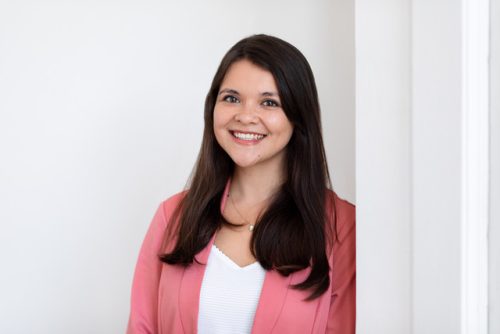Holly Shablack, PhD is a ’20 graduate of our Social Psychology program with an additional concentration in Quantitative Psychology. She is now an Assistant Professor of Cognitive and Behavioral Science and a Core Faculty member of Data Science at Washington and Lee University.
 As an Assistant Professor at Washington and Lee University, she is able to partake in activities that she greatly enjoys – teaching and mentoring, and research. Holly teaches several undergraduate classes such as Social Psychology, Health Psychology, Advanced Research Methods, Statistics, an introductory course to R and data analysis and a seminar on Language, Culture, and Emotions. These courses bolster her research, which focuses on how our socio-cultural environment and language interact with biology to shape our emotions, behavior, and well-being across the lifespan. Finding an institution and department that supports both her research and teaching growth has been invaluable and she greatly enjoys working with incredibly motivated and curious colleagues and students.
As an Assistant Professor at Washington and Lee University, she is able to partake in activities that she greatly enjoys – teaching and mentoring, and research. Holly teaches several undergraduate classes such as Social Psychology, Health Psychology, Advanced Research Methods, Statistics, an introductory course to R and data analysis and a seminar on Language, Culture, and Emotions. These courses bolster her research, which focuses on how our socio-cultural environment and language interact with biology to shape our emotions, behavior, and well-being across the lifespan. Finding an institution and department that supports both her research and teaching growth has been invaluable and she greatly enjoys working with incredibly motivated and curious colleagues and students.
Currently, some of her current research focuses on the effects of multilingualism on emotion perceptions as well as language and sociocultural influences on emotion concept learning, emotion regulation, and well-being. She takes a multimethodological approach to her work and predominantly focuses on children and young adults. Some of her work has been inspired by conversations both in and out of the classroom with undergraduate students. For example, in the wake of the pandemic, a few of her students were curious about the regulatory effects of music which led to a new line of work on auditory stimuli and emotions as well as another line looking at well-being and decision making under stress.
When asked about her time at Carolina, she stated that “My time at Carolina provided me with the means and experiences to meet the expectations of my current position.” She explained that Carolina, and especially the Social Psychology area, provided her with a great amount of teaching experience (both in and out of the classroom) and research rigor that not many other graduate programs make space and time for. Not only did it provide her with the research ethics and skills to conduct rigorous experiments, but also the mentorship on how to mentor others both in research and the classroom – something incredibly important at a liberal arts college. Furthermore, she said, “The relationships I built with professors, peers, and students are some of the most valuable ones. I love hearing updates from students over the years and meeting with them for a cup of coffee or quick video call.” She states, “Not only does Carolina provide one with well-rounded training, you also get a chance to build relationships with lifelong colleagues and work with extremely curious and motivated undergraduate students.”
When asked about advice to current and prospective graduate students, she suggests the following, “First, never stop learning. It is easy to think that you need to know everything and forget that the point of being a student is to learn. Be kind to yourself and remember that learning happens in all shapes, sizes, and speeds, in and outside of the classroom and research setting – there are endless things to learn beyond what we teach and research. Also, as scary as it may be, challenge ideas and yourself – this applies to science but also your personal life. Being open to this process leads to possibilities and directions that you may have never expected to go. That is scary but also something to embrace. Some of my best ideas, choices, and learning experiences happened when I did this. It came with immense challenges, but, also immense rewards. Carolina helped me learn and embody this the best I can, and I continue to challenge ideas and myself to be more open and more curious each day.”
